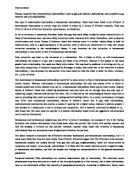An interesting point to note is that in successful business relationships, based on trust, the formal agreements will, over time, increasingly mirror the informal ones. From the increasingly informal (social) relationships between the two partners trust will start to develop. In addition, greater flexibility to respond more rapidly to changing market conditions will result. Also, research has shown that as time passes and mutual feelings of trust are increasingly invested in the relationships the likelihood of dissolution of the cooperative activities decreases (Ring and van de Ven 1994).
However, the same authors argue that the chances of terminating the relationship increase with imbalances between the formal and informal procedures. Hence, if formal commitments are not adhered to, even though the parties maintain their friendship, it is likely that the relationship will be ended.
Ring and van de Ven 1994 suggest four main causes for termination of IORs, namely;
- Repetitive and excessive structuring and monitoring of the relationship
- Repetitive conflicts between role and inter-personal behaviour of organisational parties
- Repetitive violation of trust
- Repetitive escalation of commitments to failing transactions
The concept of flexibility associated with IORs is also evident in inter-firm innovative processes. Indeed, Lorenzoni and Lipparini (1999) highlight that compared to integrated firms inter-firm relationships enjoy a higher degree of flexibility in these activities. However, although a greater exchange of ideas might be achieved, potentially resulting in successful new products and ultimately increased revenue, there still remains the possibility of opportunistic behaviour. Certainly, there is therefore a trade-off between innovation capacity and trust and security that must be taken into account before any co-operative relationship is embarked upon.
It has been claimed that similarities in the two parties (with regard to e.g. size, activities, overall strategy and goals) will facilitate the development of trust. Similarly, this is also aided by like characteristics in the agents. Hence, managers of similar rank and standing will bond with one another more readily, as would two company lawyers (Ring and van de Ven 1994). This should therefore be of primary concern when cementing a business relationship, since, as discussed below, a change in representatives may hamper the inter-firm relationship.
A word of caution regarding social interactions is needed. Developing close personal relationships within the formal business relationship can, in certain situations, have a detrimental effect for both parties. An example of such circumstances is conflict resolution. By becoming increasingly socially involved with the business partner may create hesitancy in both parties to acknowledge and to resolve disputes. In addition, this may give rise to a stagnant relationship from which neither party will benefit in the long run. However, inertia may be prevented by occasionally introducing third parties to the relationship. These actors will have a fresh mind set, which is not coloured by the existing cooperative activities and may thus contribute greatly to the innovative processes. Introducing new agents (representing the firms) may have the same effect. In this situation the relationship will once again assume a more formal structure, until the representatives get to know each other well enough to increasingly interact socially, and thus informally. This change over of agents may however occur at any time, even in a perfectly healthy business relationship due to unforeseeable events. As this may be detrimental to the inter-firm relations (since the good relationship that was built up between the two parties might possibly be lost completely and need to be re-built) companies should carefully consider the possible impact of such an action before embarking on any change activities.
Conclusion
It has been seen that trust and commitment are of great importance in successful IORs. Balanced formal and informal relationships between partners are important features of any co-operational behaviour. Trust is seen as a cost-saving element in IORs, since informality will result in more flexible business transactions. Relationships with a strong sense of trust can also have a positive effect on the innovative processes as firms are able trust each other and co-operate in a healthy and productive atmosphere. New perspectives and ideas are likely to flow more freely and result in better outputs and processes. On the other hand, trust can result in opportunistic behaviour because of the informality and lack of formal agreements. It is therefore important that companies recognise the issue of trust and the impact it might have on business performance. Careful selection of business partners and effective relationship management thus play a central role in the success of the business.
Bibliography
Friedman, R.A. “Trust, understanding and control: Factors affecting support for mutual gains bargaining in labour negotiations” A paper presented at the Annual Meeting of the Academy of Management, Miami, FL, August, 1991.
Lorenzoni, G., and Lipparini, A., (1999) “The leveraging of interfirm relationships as a distinctive organizational capability: a longitudinal study”, Strategic Management Journal, Vol. 20
Ring, P., and van de Ven, A.,H., (1994) “Developmental processes of cooperative interorganizational relationships”, Academy of Management, The Academy of Management Review, January, Vol. 19, Issue 1
Ring, P., and van de Ven, A.,H., (1992) “Structuring cooperative relationships between organizations”, Strategic Management Journal, Vol. 13
Zucker, L. G. “Production of trust: Institutional sources of economic structure” In B.M. Staw and L.L. Cummings (eds), Research in Organizational Behaviour, 8, 1986, pp.53-112







